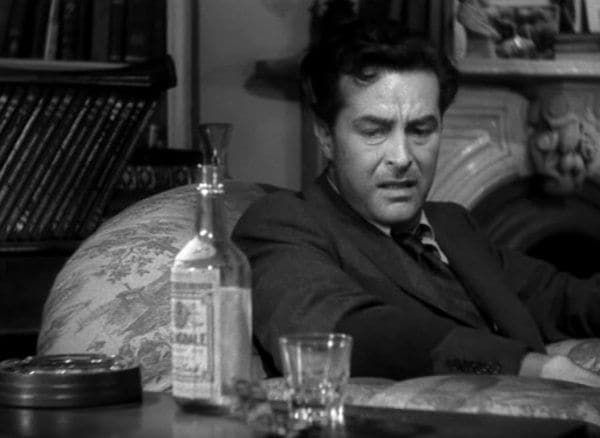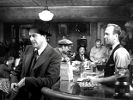Eye For Film >> Movies >> The Lost Weekend (1945) Film Review

Though it may seem tame in comparison to contemporary depictions on film of the destructive nature of alcoholism, it is worth remembering that Billy Wilder's 1945 film The Lost Weekend – adapted from the novel from Charles R Jackson whose story depicts the two-day booze-soaked descent into hell of a failed alcoholic writer in 1940s New York City - did not see an easy journey to the silver screen due to its perceived controversial nature in the eyes of the powers that be. Both the Motion Picture Association of America and the liquor industry, even prohibition groups worried that it would incite drinking, all put pressure on Paramount studios during production and even when Wilder finished shooting the film in December 1944, it was not released until November 1945.
Though the films strengths are many, the two pillars it really rests on are Ray Milland's career-best performance as despairing drunk Don Birnam, and Wilder's deft directorial mix of pathos and black comedy delivered with sharp dialogue, all played out on a canvas of stylistic flourishes that take Don on an increasingly dark and surreal journey into his own private hell on the streets and in the dry out wards of New York in one hot summer.

When we are first introduced in the opening scene to Birnam in his brother's cushy apartment, his packing for what seems like a weekend break is soon revealed to be something else entirely as we witness him hang a bottle of rye out of his window on a piece of string. This oddly funny gesture turns out to be something much darker, a ruse to enable him to sneak the bottle into his suitcase when his brother Wick (Philip Terry) is distracted, for this packing session is in fact in lieu of Don being shipped off to a out-of-town sanitarium. This initial act of deceit on the part of the seemingly charming and intelligent Don is but the first of many viewers will see. Eventually stealing money from his brother that was left for their housekeeper, Don flees and embarks on a long binge session across the bars of New York.
By the time his doggedly devoted girlfriend Helen (Jane Wyman) tracks him down, Don has sponged off bartenders and streetwalkers, nearly pawned his typewriter to buy booze, stolen a purse in a bar, threatened a store owner into handing over more liquor and spent a night in a veritable haunted house of an alcoholic ward. But Helen, to her horror, finds out Don has one more level yet to descend to, one that involves one last drink, a goodbye letter, and a pawnshop revolver. But only by falling one more step can Don - by this time truly a pitiful self-loathing wraith for whom “one's too many and a thousand's not enough” - start to put himself together again.
Milland is rarely off screen, and his work here is every bit worth that Academy award. His energetic and fearless performance, and the script, pick through the layers of this deeply troubled man in a way that is funny, painful, and involving but never sensational. The script, from Wilder and collaborator Charles Brackett, does not point Don in a direction where there is an easy answer offered to his problem nor an obvious explanation for his behaviour.
Alcohol had only recently been banned outright in the USA during Prohibition, and had long been the target of religious and conservative groups, yet here is a bold (for its time) script suggesting that Don is the victim of many deep psychological flaws rather than the whisperings of the Devil. As we spend more time with Don, both during his weekend escapades and through several flashbacks, we the viewer can begin to put together the puzzle of what is eating away at Don from the inside, though it is never laid out on a clear plate. Is it his fear at failing in his writing? Has living off his brother's largesse left him humiliated to the point where only booze can numb the pain of self loathing? Is it a midlife crisis given his perceived lack of success? Did he drink to inspire his fingers to bash out those stories on the typewriter, convinced a little fire in the belly would inspire the mind?
Maybe it is all these things, or none of them. What is clear is that Don is human, and human problems will need human solutions, including facing up to the depths he has sunk to. Thus the long weekend we spend with Don becomes part psychological profile, and, for Don at least, part confession (appropriate given he is a writer). Even at the end we are offered no easy way out, though there is a glimmer of hope (perhaps the films only awkward moment). We are also invited to mull over the actions of those around him too - are the various figures Don encounters enabling him or helping him?
The journey to that end is not just a showcase for Millard, but also for Wilder, who gradually takes the film from a neo-realist/documentary-like start to darker and darker places as Don falls further, eventually letting the atmosphere become outright nightmarish by the time we reach the dry-out ward, echoing of the howls of the DTs and drenched in jagged shadows like a German Expressionist film. Wilder famously also shot scenes with Millard on location on the streets of New York with hidden cameras to add layers of immediacy, authenticity and grit. Composer Miklos Rosza's eerie theremin score also helps convey Don's increasing confusion, despair, and lust for the next hit, which is never enough.
Despite its controversial nature and the pressure put on Paramount before its release, the final victory would be the studio and Wilder's, as the film went on to win multiple Academy Awards including for best picture, director, actor, and screenplay. Thus The Lost Weekend's re-release on BluRay, with sharp picture quality and packed with the kind of extras you expect from the Master of Cinema's remastered range, is a reason to celebrate.
Reviewed on: 25 Jul 2012
















